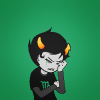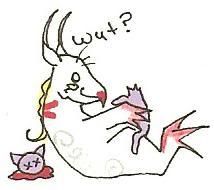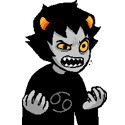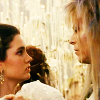Post by Bee on Dec 14, 2009 1:29:23 GMT -5
So I'm posting two prompts tonight. Here's the first, the angsty one, written for Number 38 on my prompt table: Enemy. Warnings for probably somewhat inaccurate depiction of OCD and some weird-ass child abuse.
___
Chaos is the enemy.
The books are stacked in eight piles and she needs them to be nine, desperately needs them to be nine, but every time she comes back into the room, the books have been moved. Now the stacks are uneven as well as the wrong number. Nine by nine, but not right now. She worries her bottom lip with her teeth until it bleeds. They keep moving.
She moves them. She moves them, Illyria knows, because it drives her insane, and she likes to drive Illyria insane. She comes into rooms when Illyria leaves and she moves things. Illyria never knows what things, and it nags at her, gnaws on her brain like termites, and she’s not satisfied until she’s inspected the entire room, looking for irregularity, and she’s put things back in their places. She’s spent hours on it before. She can’t stop herself, no matter how much she wants to.
Choices are the enemy.
Illyria’s already learned that she never picks the right anything, but the aunt always presents a choice, and she always has to choose. It’s important to her aunt, somehow, to give her the illusion of choice, that there is a right way and a wrong way, and that she’s just as likely to select the right answer as the wrong. But probability does not work that way here. It’s always wrong. They both know it. But she has to choose.
“Do you think you deserve a pet?” her aunt asks, over her book. They’re in the drawing room, with the filmy curtains pulled over the windows to block the sunset. Their gaslamps illuminate their reading. Illyria is diligently running over the lines of her history book—the history of this region, history that the aunt will quiz her on.
She’s startled by the question. She’s looked longingly at bandersnatches before, run of the mill dogs, birds, anything. She’s never asked for one.
The question, she realizes, a beat later, is loaded. Deserve is such a heavy word. Not “do you want one.” She weighs the question.
“No,” she says, quietly, hesitantly, hoping that answer will appease her, but already knowing, dimly, that it’s wrong. It would be wrong if she’d said yes too. Yes would mean she thought too highly of herself, didn’t consider what a trial having a pet would be, how little her aunt liked bandersnatches.
Her aunt slams her book shut. Illyria nearly jumps out of her skin.
“Go to your room,” she orders. “I don’t need to hear about your pathetic lack of self-esteem. I can’t believe my sister left me with such a spineless little girl.”
Eyes are the enemy.
Her aunt’s eyes, precisely, the ones that watch her every move. The aunt can’t be everywhere at once, she knows, but she’s dropped hints that she has the magic—to watch, from stuffed animals, dolls, mirrors. Illyria doesn’t know whether it’s true. But the paranoia takes hold hard, and it’s enough, just the hint, to make her throw all her stuffed animals into a bag and keep them in her closet—even Lancelot, her favorite, her woobie, that Mummy gave her before she left for Esterberry the year before, before Mummy left forever.
She wants to hold Lancelot while she falls asleep, because without him she tosses and turns for hours, but she can’t bear to look at him. Whenever she sees his bead-black eyes, she imagines the aunt’s yellow shining through them, watching, calculating, ready to catch her doing something bad.
She wants to look at herself in the mirror when she brushes her hair, 81 strokes of the brush, to make sure she gets the part right, but she’s thrown the mirror away. She turns the others around, so they reflect only the wall, but the aunt always sets them right.
Watching you, she says. Don’t forget.
She doesn’t. She can’t.
Ignorance is the enemy.
Her aunt doesn’t usually strike her. She just grabs, too hard, or yanks at her hair so her head’s a little lumpy sometimes, but she rarely ventures beyond a slap. Even then it’s a measured, precise blow to the side of her face, enough to sting but not to mark.
Sometimes, when it bruises, she walks out into the streets and wonders if anyone sees it, if anyone wonders, if anyone thinks about asking.
They don’t. It’s not, she eventually realizes, that they see and ignore, it’s that no one sees at all. No one averts their gaze, guilty, because nobody looks in the first place. She’s a little nobody. She’s sure she didn’t used to feel that way, but sometimes it’s hard to remember. It’s only been a few months, and she needs to sit and think, hard, for Mummy and Mommy to come back, to feel like a something. She looks at the closet where Lancelot-with-the-aunt’s-eyes is crushed in his bag, and she’s near overwhelmed with terror, because soon she thinks she’ll forget entirely.
There won’t be a Mommy or a Mummy, just an aunt and a nobody and eyes.
She knows her enemies. It doesn’t help.
___
Chaos is the enemy.
The books are stacked in eight piles and she needs them to be nine, desperately needs them to be nine, but every time she comes back into the room, the books have been moved. Now the stacks are uneven as well as the wrong number. Nine by nine, but not right now. She worries her bottom lip with her teeth until it bleeds. They keep moving.
She moves them. She moves them, Illyria knows, because it drives her insane, and she likes to drive Illyria insane. She comes into rooms when Illyria leaves and she moves things. Illyria never knows what things, and it nags at her, gnaws on her brain like termites, and she’s not satisfied until she’s inspected the entire room, looking for irregularity, and she’s put things back in their places. She’s spent hours on it before. She can’t stop herself, no matter how much she wants to.
Choices are the enemy.
Illyria’s already learned that she never picks the right anything, but the aunt always presents a choice, and she always has to choose. It’s important to her aunt, somehow, to give her the illusion of choice, that there is a right way and a wrong way, and that she’s just as likely to select the right answer as the wrong. But probability does not work that way here. It’s always wrong. They both know it. But she has to choose.
“Do you think you deserve a pet?” her aunt asks, over her book. They’re in the drawing room, with the filmy curtains pulled over the windows to block the sunset. Their gaslamps illuminate their reading. Illyria is diligently running over the lines of her history book—the history of this region, history that the aunt will quiz her on.
She’s startled by the question. She’s looked longingly at bandersnatches before, run of the mill dogs, birds, anything. She’s never asked for one.
The question, she realizes, a beat later, is loaded. Deserve is such a heavy word. Not “do you want one.” She weighs the question.
“No,” she says, quietly, hesitantly, hoping that answer will appease her, but already knowing, dimly, that it’s wrong. It would be wrong if she’d said yes too. Yes would mean she thought too highly of herself, didn’t consider what a trial having a pet would be, how little her aunt liked bandersnatches.
Her aunt slams her book shut. Illyria nearly jumps out of her skin.
“Go to your room,” she orders. “I don’t need to hear about your pathetic lack of self-esteem. I can’t believe my sister left me with such a spineless little girl.”
Eyes are the enemy.
Her aunt’s eyes, precisely, the ones that watch her every move. The aunt can’t be everywhere at once, she knows, but she’s dropped hints that she has the magic—to watch, from stuffed animals, dolls, mirrors. Illyria doesn’t know whether it’s true. But the paranoia takes hold hard, and it’s enough, just the hint, to make her throw all her stuffed animals into a bag and keep them in her closet—even Lancelot, her favorite, her woobie, that Mummy gave her before she left for Esterberry the year before, before Mummy left forever.
She wants to hold Lancelot while she falls asleep, because without him she tosses and turns for hours, but she can’t bear to look at him. Whenever she sees his bead-black eyes, she imagines the aunt’s yellow shining through them, watching, calculating, ready to catch her doing something bad.
She wants to look at herself in the mirror when she brushes her hair, 81 strokes of the brush, to make sure she gets the part right, but she’s thrown the mirror away. She turns the others around, so they reflect only the wall, but the aunt always sets them right.
Watching you, she says. Don’t forget.
She doesn’t. She can’t.
Ignorance is the enemy.
Her aunt doesn’t usually strike her. She just grabs, too hard, or yanks at her hair so her head’s a little lumpy sometimes, but she rarely ventures beyond a slap. Even then it’s a measured, precise blow to the side of her face, enough to sting but not to mark.
Sometimes, when it bruises, she walks out into the streets and wonders if anyone sees it, if anyone wonders, if anyone thinks about asking.
They don’t. It’s not, she eventually realizes, that they see and ignore, it’s that no one sees at all. No one averts their gaze, guilty, because nobody looks in the first place. She’s a little nobody. She’s sure she didn’t used to feel that way, but sometimes it’s hard to remember. It’s only been a few months, and she needs to sit and think, hard, for Mummy and Mommy to come back, to feel like a something. She looks at the closet where Lancelot-with-the-aunt’s-eyes is crushed in his bag, and she’s near overwhelmed with terror, because soon she thinks she’ll forget entirely.
There won’t be a Mommy or a Mummy, just an aunt and a nobody and eyes.
She knows her enemies. It doesn’t help.












 But wonderfully done.
But wonderfully done.